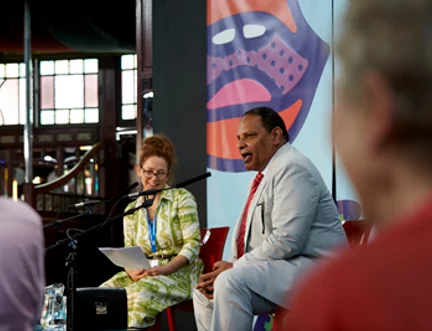More articles Monday 15 August 2016 7:15pm
Alaa Al Aswany - A Voice for Egypt at the Book Festival

Alaa Al Aswany is known in his native Egypt for his forceful, clear-eyed take on politics and human rights, and he speaks with the expansive confidence of one who knows exactly where he stands on things. And yet when it comes to writing fiction, the celebrated author of the million-selling The Yacoubian Building favours a passive approach. “Writing a novel is an organic process,” he told his audience at the Book Festival this morning. “It belongs to life much more than to theory. It’s like falling in love: you might be able to explain why it happens, but the most important reason for it is not definable.” So it was that Al Aswany realised only after completing his new book, The Automobile Club of Egypt, how precisely it operated as an allegory for the 2011 uprising against Hosni Mubarak’s government, triggered by protests in Cairo’s Tahrir Square, in which he participated. “Although this story happens in the 1940s,” Al Aswany said, “all of the questions of the Arab Spring exist in this novel.”
The Automobile Club of Egypt is a real place, also in Cairo: an upmarket members’ club which largely caters to wealthy Europeans. Al Aswany’s father served as its lawyer during his boyhood, and he recalls spending time there and observing the servants at work. “I kept this in my mind and my heart for years,” he says. In his book, an element of this workforce rebels against its overbearing masters. The variable responses of people to a state of servitude was a frame for the novel as well as a means to explore recent Egyptian history.
“When we think of a dictator,” Al Aswany said, “we think he is a bad man; he is corrupt; he is violating the human rights of his subjects. All of that is true – but there is another factor, which is that he is a protecting father. He gives order; discipline. There are still people who think Mubarek was our father. He was corrupt. He was violent. But – he was there.”
The attempt to lend understanding to such responses is, to Al Aswany, an important function of literature – and the aspect that separates it from the simplistic morality of soap opera. “Literature is trying to explain that we are all human beings and that everybody has good things and bad things in his heart.” And for that analysis to be accessible to everyone, he argued, novels should above all nbe readable. “It is very easy to write a text that nobody understands!
Reading a novel should be a pleasure. If the novel is boring, then you’re not a good writer.” He cited his own study as a dentist, which required the learning of endless Latin terms for parts of the body. “It was a real torture, but you have to study it because you have an exam. This is not the situation for the reader! The reader doesn’t have an exam – and he has the right to throw the book away.”
Still, such rights – to choose what to read; to have and share subjective responses – are restricted in Egypt. “Freedom of expression in Egypt now is worse than ever before,” Al Aswany said. He himself is banned from television appearances, and his articles go unpublished in local papers. The issue, he said, is the mingling of personal matters of religious adherence with public policy. “Religion is emotional and exclusive. Everyone thinks his religion is the right one. When you apply this model in politics, inevitably you will become fascists. You do not recognise the rights of other people because they do not have the right God; they are less than you. Religion should be kept as an individual thing. The state should be secular.”
This author, despite best efforts, remains difficult to silence – fluent in numerous languages; translated into many more; a beloved storyteller and a winning, charismatic interpreter of his nations’ glories and traumas. Or, to put it his way: “I’m a chronic troublemaker.”
- 2025 Festival:
- 9-24 August
Latest News
 Communities Programme participants celebrate success of 2024
Communities Programme participants celebrate success of 2024



